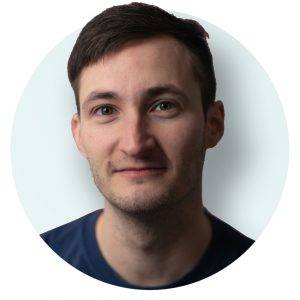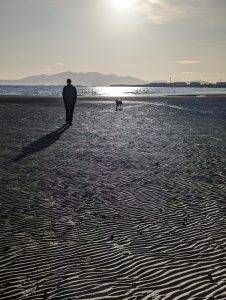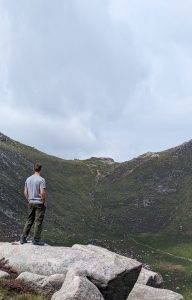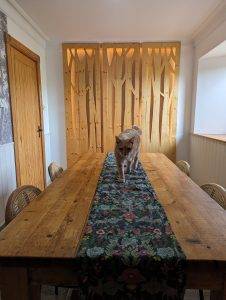Overwhelm will kill your progress and derail the life you intended.
When we are overwhelmed we make rash decisions,
we snap and damage our relationships,
and we can’t appreciate the good fortunes we already have.
Overwhelm is a huge issue for introverts.
Just look up #burnout and it’s obvious to see how big this issue has become.
Every week on LinkedIn you hear another story of burnout.
It’s easy to see why:
We live with supercomputers in our pockets, yet are busier than ever.
Social media tells us it’s no longer acceptable to be average, or ordinary.
We are bombarded with 1% success stories and 6 figure business success.
It’s a recipe for stress.
I’m no stranger to burnout and overwhelm.
As an introvert, even setting aside time to think and process, I find the sheer volume of information we are subject to nowadays overwhelming.
I’d say it creeps up with me at least every 6 months.
Usually brought on by increased attention on my social insights and analytics
The creeping feeling of inadequacy, that I haven’t got enough, done enough, achieved enough.
I always think I’ll get better at recognising the signs.
I desperately crave a simple, hermetic life of creative writing, learning through reading, and appreciation of nature.
Alas, I work in marketing 🤣
Simplify your life, multiply your output.
The opposite of overhwlem? clarity.
We get clarity through simplifying our lives.
Simplicity = clarity
- Clarity helps you make better life decisions
- Clarity multiplies the output and quality of your work
- Clarity leaves room for reflection and happiness
But we all face a regular onslaught of tiny tugs on our attention.
I’m not talking about your kids, I’m talking about email, social apps, call centres, online forms, Clickup notifications, sales call, on and on and on.
All apps designed by clever people paid 6 figures a year with only one mission: consume as much of your attention as possible.
It’s no wonder we lack the space or mental clarity required to ponder our purpose, make considered decisions, or live intentionally.
Modern life is geared towards shallow tasks, Often with no reward, no endpoint and and no closure.
If you want to simplify your life,
Willpower is not enough. You’ll need an arsenal of knowledge, self awareness, habits, tricks and mechanisms to manipulate yourself.
So here is a series of tools I’ve learned from the masters to simplify my life.
I won’t try to summarize their work,
I’ll share how they helped me as an introvert, and as a lifestyle business owner.
I’ll try to resist simply parroting their thoughts with nuggets of stolen wisdom:
Their writing does this far more deftly than ever could,
Some will seem extreme or unnecessary.
But if you want to think clearly
And get x5 more done than anyone else,
And still have time left over for your favourite things
You won’t get there by doing things like everyone else.
The books are linked for your convenience, but these are not affiliate links
I urge you not just to read, but to implement the teachings in these books:
📕 Deep Work
Recently I’ve been building a new extension on my house, and my new office in the garden
It required long, back breaking hours of hard work, meticulous planning, acute attention for implementation.
The kind of tasks that you suddenly find hours have gone by without you being aware of any internal monologue or though process.
Some of my happiest times this year were when I was knee deep in a hole, digging out a pond,
or hanging off a ladder sawing timber.
This is exactly the state described by Mihaly Csikszentmihalyi in Flow,
and expanded upon for the knowledge worker in Deep Work by Cal Newport.
Whilst Flow explains the theory of why this state makes us happy,
Deep Work explains the beneficial effects that Deep Work habits can have on your larger life,
in terms of your happiness levels, stress and abilities to focus your attention.
Plus how to apply a daily habit of deep work.
One of the key takeaways is that we are at our happiest when we are in a state of flow
Things I changed after reading Deep Work
- Download Freedom to block your addicts attempts to distract yourself.
- Use pomodoro technique for focus blocks of time
- Timeblock tasks to get more meaningful tasks done more quickly.
- Truly remove distractions from your work environment.
- Brain.fm (try it, it really works)
📕 The Shallows: how the internet is changing the way we think.
Recently, my wife and I ventured out from our rural paradise to take in the bright lights of the city.
We took the train so that we could get sloshed.

On the train I resisted my phone and opted instead for people watching.
I observed someone in the aisle opposite:
- He would open instagram, , rapidly skim his feed, double tapping every image that came up, seemingly regardless of whether he “liked” them or not. He didn’t even seem to look.
- Then messenger, quicly replying to several threads,
- Then news, scrolling through x3 -5 articles on rapid fire. I don’t believe anyone can read that fast.
- The whole routine took about a minute.
- Then his phone would go back in his pocket….for 15 seconds
- Then his knee would start to tap for 10 seconds
Then his whole leg jiggle for 5 seconds. - Then out comes the phone again.
- same process again and again and again. rinse and repeat.
I could have timed my watch by it. He was completely unaware of it.
These behaviours are so commonplace and so normalized that we don’t realise how out of hand this whole situation has become. The effect on society must be enormous.
It’s impossible to operate without a mobile, but you can manage your addiction, if you want to pay more attention.
It starts by paying attention to what you pay attention to.
A question for you…
When was the last time you were bored?
At the slightest hint of boredom you can open your phone or turn on tv TV.
Here’s some stats which terrified me:
average tv time in the UK 2.5h per day.
In the US it’s 4h per day. I have no idea how they fit it all in.
But what you watch is more important than how much.
Try setting an intention for your entertainment vs education ratio.
Education doesn’t have to be boring. Here’s some stuff my wife and I love doing.
- Podcasts
- Reading or audiobooks.
- Painting drawing, building
- Other creative acts.
- Walking
This book made clear to me the obvious truth that hides in plain sight:
We are all addicts to our phones.
You know, I know it, everyone knows it.
Phones are addictive distraction engines and prevent you being present with your work, your life, your kids.
Yet we walk about with them in our pockets, or sometimes even our hands all the time.
Would you let an alcoholic walk about with a pack of beer, in constant sight relying only on her willpower to resisting cracking that can open?
Things I changed after reading the Shallows
- I leave my phone behind, instead carry a tiny police notepad to capture thoughts,
- Turn of all push notifications on my phone.
- Schedule do not disturb mode from 9-12 and 1-4
- I use a minimalist launcher – no icons no colours
- I resist the urge to whip out my phone out in the queue, or on the loo.
📕 The 80/20 principle
It’s a universal law that applies to everything
80% of the leads belongs to 20% of the competition
20% of your efforts produces 80% of the results.
It also applies to your life.
That means 80% of what you do has so little effect, that you might as well stop doing it. 🤯
This is the secret as to how some people seem to get so much done and still have so much time left over.
They simply only work on the things that move the needle.
When you adopt this habit many will call you crazy.
- “You can’t just ignore that! “
- “You have to respond to this!”
- “I can’t just stop doing this thing.”
You can. try it and see what happens. If nothing noticeable happens then you probably don’t have to do it.
You won’t build a lifestyle business without burnout, unless you’re willing to do things others aren’t,
and to stop doing things others think they have to.
Things I changed after reading the 80/20 principle
- I work on the most important task, first thing in the morning.
- Categorize tasks by urgency, importance AND impact
- Don’t open email or socials until after lunch
📕 Atomic Habits by James Clear
Imagine yourself out on a hike, trekking along a rocky forest track.
It’s treacherous, there are rocks, roots, slopes, loose gravel.
Yet you don’t actively think about where you place your feet.
Somehow your body knows before each foot falls, exactly how much grip you’ll have.
The angle of your foot placement, the pressure, the gait, all of it is handled automatically.
You even how it will feel when you place your foot there.
This is because your brain has spent years building a prediction engine which we call this muscle memory.
You’ve spent your whole life learning how to place your feet.
This complex calculation of weight ratio, slip differentials, surface tension all happens automatically.
You can apply this across your life to accomplish even complex tasks without mental tax.
This is why routine and habits become so important.
They allow you to complete life admin on autopilot and
Which leaves brain power and willpower for the important decisions.
But Atomic Habits work both ways.
You probably don’t realise how many habits you have, good and bad.
It’s important to cull your bad habits before they become fully formed, and start building the right habits which will put your life on easy mode.
Things I changed after reading Atomic Habits.
- I do 10 mins of exercise within 5 minutes of waking up.
- I always call enquiries before lunch.
- I walk 20 mins before starting to work to plan the day and work on the RIGHT things, instead of whatever’s on my desk
- I have a shutdown routine when I leave work to put my mind in wind down
📕 The Compound Effect by Darren Hardy
If Atomic Habits is bread, the Compound Effect is the jam.
The peas and the pod
The fish and the chips.
The ying and the yang.
These two books multiple each others benefits.
The premise of this book is pretty simple:
Eat a chocolate bar after dinner every evening.
You won’t notice much difference for months, but behaviours add up over time into a trend.
Before you know it your overweight, and it’s hard to reverse your momentum.
In fact each time you reinforce the habit.
Immediately after reading atomic habits, I dove into the compound effect,
and discovered the secret formula of serial entrepreneurs.
Consistency + Time
This completely changed my work ethic.
I used to be a member of the hustle club:
Just work harder, longer, faster, more.
Now I focus on cutting the useless 80 and focussing on consistency on the 20 that moves the needle.
Huge efforts and all-nighters, and Eureka moments
In the West we are obsessed with the genius savant, the risk taking entrepreneur, the youtube sensation.
This might look appealing. But meanwhile there’s someone who’s never been on Facebook, quietly doing the boring work and earning 7 figures selling toothbrushes on ebay.
My key takeaway from this?
I start building the habits that changed my life trajectory, to steer my life in the direction I wanted.
No massive changes. just small shifts. A little bit harder in the short run, to make life easier in the long run.
So after reading this book was the point where I sat down and deliberately designed my daily schedule, setting aside time each day or week to work on the things that move the needle:
- Call the enquiries. Engagement on social. Morning workouts. Do the work.
- Make the time, and do it every time.
- Repeat for a long time.
That’s how success is achieved, how goals are smashed, how empires are built.
Things I changed after reading the Compound Effect
- I wrote to a schedule and stick to the things I decide are important
- I do a weekly review to make sure I stay on track
- I do a monthly review with big picture questions
- I assembled a teem of peers to compare the above with.
But building empires and smashing goals won’t make you happy….
📕 Happy by Derren Brown
I left this one till last as it had the biggest impact on me,
Many of you will know Derren Brown only as a celebrity magician, famous for his acts of hypnosis and mental magic.
This is just the surface. He’s a truly inspiring person, an artist, an author, a scholar and a philosopher. Above all he’s an expert on the human mind.
If I could recommend only ONE thing that they should be teaching in schools for coping with modern life?
It’s not maths, not English, not social studies or business.
It’s philosophy.
Happy was my first introduction to Stoicism, and it has had a huge influence over the way I see the world, on my mental resilience, optimism and happiness.
It’s not “philosophy” as you might imagine it. There are no Schrodinger’s cats to be seen.
This is practical, accessible and impactful advice on how to deal with life’s challenges.
These teachings were largely forgotten by the west for a long time, but this ancient wisdom is as relevant as ever.
More so, probably.
I hadn’t realised until reading this book, just how much everything I did was to impress people I don’t know or even like.
Happiness teaches you to learn your validation from within, instead of judging yourself through others perception of success.
It taught me to love the process instead of chasing the goal.
At least it taught me to try. I frequently need reminding.
Stoicism teaches you a kind of funny pessimism that allows you to laugh at life’s misfortunes and challenges.
A lot of these are antidotes to conventional self-help books which often spout comforting platitudes catering to what people want to hear, instead of what they actually need to hear.
Things I changed after reading the Happy
- Endless positivity is for fools. Instead practice imagining how it would feel to lose the things you love.
- I recognise that people are often shit and it’s fine, because we’re all shit sometimes.
- I Pre-rehearse all the things that could go wrong, and I’m pleasantly surprised when they don’t.
- I recognise I’m not a special snowflake. We don’t all automatically deserve an exceptional life, otherwise no-one would be exceptional. Instead, we are all just insignificant specs hurtling through space and time on a pale blue sphere. All my problems don’t seem that big a deal now.





















